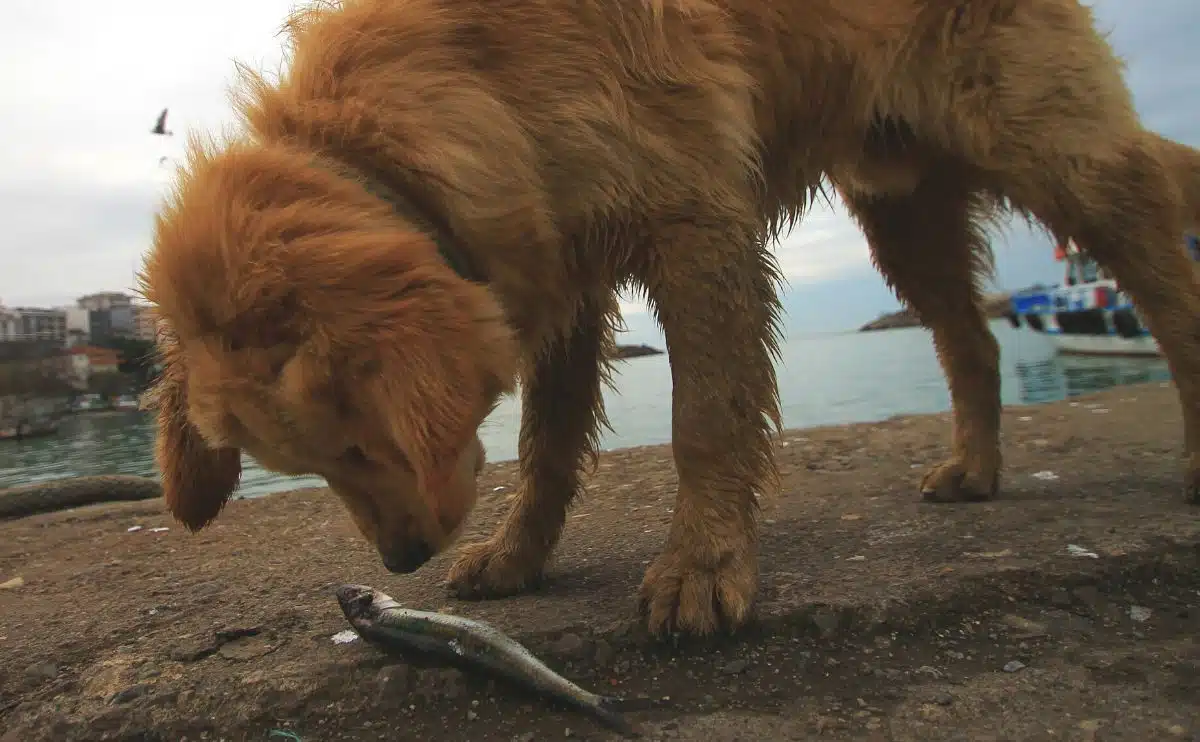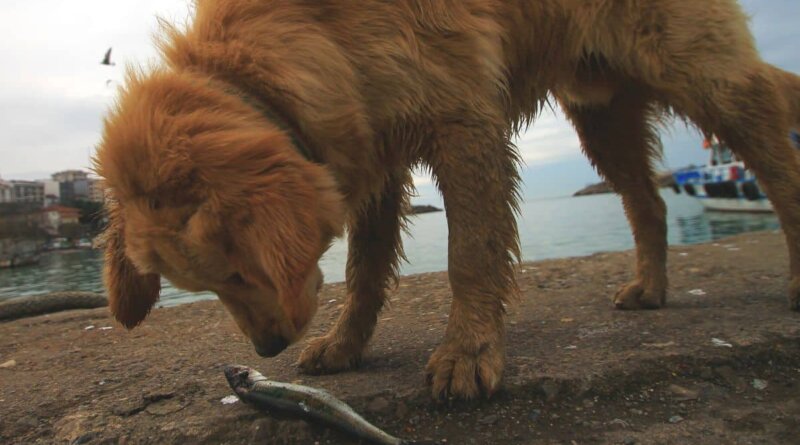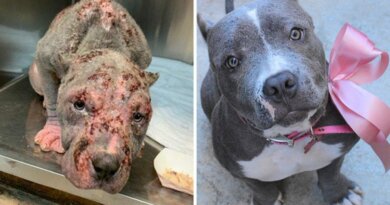Why Does My Dog Smell Like Fish? (How To Fix Their Stinky Butt, Breath & Pee)
To keep the lights on, we receive affiliate commissions via some of our links. Our review process.

Owning a dog means experiencing a plethora of different smells. Not all of these are good smells. One thing in particular that stands out is when a pup has a fishy odor. This fishy odor can come from the front end, back end, or simply seem to come from everywhere. Canine owners ask a common question: why does my dog smell like fish? The answer is not simple and often involves your dogs’ anal glands, but there are several reasons for a fish-like odor. If your dog has a fishy smell, it can be overpowering and incredibly stressful for owners. Understanding why your pup smells funky and what steps to take next is essential.
Why Does My Dog’s Butt Smells Like Fish
A common concern that comes up for many canine owners is why a dog’s butt might have a fishy odor. The answer is not pleasant for either owner or the pup. In most cases, a fishy smell coming from a canine’s rear end means they are having an anal gland issue.
Anal Glands
Canines have anal glands, also called anal sacs. These sit on each side of the inner anus and contain sweat glands, and emit an odorous fluid with a unique scent to each pup. This fluid releases every time they have a bowel movement, acting as a scent marker. The odor lets other canines know another canine was there before them.
Along with expressing this odor when animals pass stool, anal glands can express fluid when they get scared, alarmed, or startled. Loud noises, unexpected events, taking a car ride, going to the vet, or anytime they feel sudden stress can cause the anal glands to release and emit this fishy odor.
In some cases, anal glands can become impacted or irritated, which is extremely uncomfortable. Dogs will show their owners signs that they are under stress, including excessive licking in the area and scooting around on their bottoms.
Anal glands are meant to express scent every time a canine poops. This is normal. Some dogs can have difficulty if this does not happen and will require help. The anal glands can also become impacted, which is quite uncomfortable and even painful. Overweight dogs and small breeds are more prone to anal gland issues, though they can develop in any breed or mix. Anal gland discomfort can be very unpleasant. Owners may notice a sudden foul odor, foul-smelling fluid spots left behind after their pup has been somewhere, licking and scooting on their back end, swelling or redness around the rear end area, and difficulty or straining to pass stool.
Diarrhea, environmental allergies, obesity, low fiber, anal sphincter dysfunction, and even genetics can cause gland dysfunction. Some breeds that are at an increased risk of developing these problems include Basset Hounds, Beagles, Cavalier King Charles spaniels, Chihuahuas, Cocker spaniels, Lhasa Apso, Spaniel Poodle cross breeds like the Cockapoo, Shih Tzu, and Bichon Frise. Anal sac disease is a term used to refer to a variety of conditions that can occur, including infections, tumors, and impaction.
Dog Anal Gland Smell
The smell from the anal glands can be described as musky. It often has a distinctive odor that smells similar to rotten or aged fish or has heavy metallic aromas. The pungency will depend on this specific pup. Any time you detect a strong fish-like odor coming from your pup’s rear end, the butt glands are likely involved. If your pump seems to be in discomfort or the stink grows increasingly intense, it is best to schedule an examination with your veterinarian. Take it from our experience. You don’t want to risk making this worse, so professional advice is best before trying any DIY treatments.
How To Get Rid Of Dog Anal Gland Smell
After identifying the cause of a fishy stench, getting rid of it is another challenge. Of course, the first step is to treat the problem. Owners must know that no at-home treatment or method will solve this problem. Your pup needs to be seen by the vet to have their anal glands expressed.
If your pup’s anal sacs have become impacted or infected, you may need antibiotics prescribed. Some veterinarians will also prescribe a sedative if pets are in a lot of pain and the sacks must be flushed out. In some cases, pet parents may have to express the sacs regularly to prevent future problems manually. Some people prefer to leave this up to the veterinarian as it is an uncomfortable experience for both the pet and the owner. If you choose to try to do this at home, it is best to ask your veterinarian for guidance and input on the right way before trying it yourself.
Anal glands can be expressed externally or internally. To express them externally, use a soft tissue or cloth to slowly and softly squeeze the rectal area. Do this from the outside and softly massage the area as the fluid releases. This can be helpful, but owners cannot empty the sac fully using this method.
Internal expression requires inserting a gloved index finger into a dog’s anus. The sacs must then be gently squeezed one at a time between the index finger and thumb. This is a more effective method but far more invasive. Many pet parents prefer to have their veterinarians take on this task.
Other Methods
To get rid of the fishy stink, owners can try a variety of methods. These include pet cleaning wipes that come in many scents, are soft, and often hypoallergenic. These are quite convenient and work temporarily. However, these may not be effective for all pups, especially those with long hair near the butt area.
Some veterinarians use a canine ear-cleaning solution to remove the musky aroma. Soak a cloth in the cleaner and then use that cloth to clean the area.
Keeping your pup’s rear end clean is another helpful tactic. Instead of washing the entire pup, simply scrub the rear end and legs with a high-quality, odor-controlling pet shampoo.
Pet cleaners that contain enzymes are helpful, but these are most often made for furniture or fabric, not to spray directly on your pet.
Why Does My Dog’s Breath Smell Like Fish?
Not all fish-like odors come from a dog’s rear end. Some can start in the mouth. Fishy-smelling dog breath is a complaint many owners have. Unfortunately, dental disease is common in canines. An estimated 80-90% of canines will have some degree of dental disease by the time they reach three years old. A foul, fishy odor can come from cavities, abscesses, or foreign objects stuck in the mouth. Dental care and teeth brushing are essential to prevent dental breakdown and disease.
In some cases, fish-smelling breath can come from the anal sacs, especially if a pup is licking excessively in that area. Canines experiencing diarrhea may have glands that are not expressed, causing them to lick more in that area. This can contribute to foul-smelling breath. Unfortunately, the grossness does not stop there. Sometimes fishy, foul-smelling canine breath can be because they are eating poop. It might be their poop, other pets’ poop, or random wild animal poop they come in contact with. This behavior is gross and dangerous, as feces contain many different bacteria and microorganisms that are detrimental to canine health.
How To Combat Fishy Breath
One thing owners should keep in mind is that the key to fresh breath for canines is their diet. Canines that are experiencing digestive issues are more likely to experience gland malfunctions, as well as lick that area more. It is essential to ensure your pup is not allergic to the protein or other ingredients in their food or has other food sensitivity issues owners should be aware of. Diet imbalances can lead to poor digestion and soft or loose stools.
Adding probiotics to your pup’s diet can help balance harmful bacteria with good ones. Striving to feed your dog a diet made from high-quality ingredients that are easy to digest is a safe way to go. In some cases, digestive sensitivity can happen if pets eat food with more than one animal protein source. Switching to a single protein source diet and avoiding corn, wheat, and soy may also be beneficial. Additionally, the use of dental chews can be helpful in keeping bad breath at bay.
Very foul-smelling breath can also be caused by bowel disease, kidney disease, or diabetes mellitus. If your pup has persistent foul-smelling breath, it is best to consult your veterinarian and rule out any underlying medical causes.
Why Does My Female Dog Smell Like Fish?
A female pup’s fishy smell can be due to a yeast infection or bacterial infection such as vaginitis. These infections can occur in the vagina or on the skin around the genitals. Other symptoms may include redness, itching, and yellow discharge. A vet can diagnose the issue and prescribe medication to treat the infection and eliminate the odor.
Another cause of a fishy stink in female canines is pyometra, an infection of the uterus. This most often occurs in females that have not been spayed but can happen after spaying in extremely rare cases. In these circumstances, a small amount of an ovary remains after the spay procedure, which can then become infected. Pets will become incredibly ill with this infection, so medical treatment as soon as possible is necessary.
Yeast infections can also occur in the ear. Along with that, breeds that are heavily wrinkled, such as Shar-Peis and Bulldogs, may develop overgrowth of yeast and infection within the many folds of their skin. This can also lead to a foul-smelling odor.
Why Does My Dog’s Pee Smell Like Fish?
Sometimes owners notice a foul or fishy-smelling odor coming from their pup’s urine. This is often caused by a urinary tract infection (UTI) from bacterial build-up that enters the system through the urethra. UTI symptoms may include frequent urination, straining to urinate, and blood in the urine. Other causes of urinary issues include kidney or bladder stones. It is best to contact your veterinarian if you notice your pet’s urine smelling like fish. Urinary tract infections are more common in females than males.
Why Does My Dog Smell Like Fish When Scared?
When canines get scared, it is a natural reaction for the anal sac to release a little liquid. This liquid has an extraordinarily strong scent, often described as a fishy smell. When they are startled, stressed out, or frightened, this triggers the anal sac to empty. This is a natural defense mechanism that helps to deter predators.
Other Causes Of Fishy Smell In Dogs
Other diseases and medical conditions can also cause a fish-like odor in dogs. These include long-term conditions like diabetes, autoimmune disease, parasitic infection, long term skin issues such as yeast infection, bacterial infection, and dandruff. Never dismiss a foul odor coming from your pet. It is always important to pay attention and seek medical consultation. Often, a foul-smelling scent indicates something more serious going on. Prompt treatment offers the best chance at a full recovery.
How To Get Rid Of Fishy Smell From Dog
Getting rid of the fishy smell is not a simple process. The first step is to identify the cause of the stench. Odors can come from malfunctioning anal sacs, animal gland disease, dental decay, dental infection, periodontal disease, yeast infection, urinary tract infection, or other underlying diseases. In most cases identifying the root cause of this foul odor requires the help of a veterinarian. In the case of impacted or malfunctioning glands, the only way to help your pup relieve discomfort and neutralize the odor is to have the sacs expressed, most often done by the veterinarian.
If the root cause of a dog’s fishy stench is anal gland disease or malfunction, owners will need to ensure they are regularly checking on and helping dogs express these to avoid further discomfort or issue. If the cause is something different, such as tooth infection, or periodontal disease, owners will also need to take steps and seek assistance from a veterinarian.
After getting treatment, and in some cases medication, from the veterinarian, owners will need to perform regular maintenance. This can include expressing the glands, keeping the rear end area clean, routine dental cleaning and tooth care, and taking steps to help prevent urinary tract and yeast infections. Unfortunately, there is no easy solution to solving and preventing a fishy odor in dogs.
Frequently Asked Questions
Is it normal for dogs to smell like fish?
Any strong odor coming from your pup is worth investigating. While fishy smells are common, your pup should not always smell like fish. When the sacs release, the smell should dissipate after a brief time. It is best to contact your vet if your pup smells like fish for longer or if the musky odor never goes away.
How often do dogs need their anal glands expressed?
This depends on the individual animal. Expression is not something owners should expect to do regularly unless their pup has a specific problem.
Keeping Anal Glands Healthy
One of the most effective ways to manage a fishy smell from your pet is to try and prevent it. Focusing on anal gland health is important. There are several steps owners can take to help keep their pups healthy with proper gland function. These include regular daily exercise, a healthy diet, and maintaining a proper weight. Ensure dogs are getting diets with adequate amounts of fiber to aid digestion. These can include high-fiber snacks like sweet potato, oatmeal, and pumpkin. Owners must also monitor their dog’s bowel movements to ensure they are regular and are forming properly. Ensuring dogs have regular access to fresh, clean water is also essential. Owners may also want to consider a probiotic supplement.
Discuss any significant changes to your dog’s diet with your veterinarian, especially if you want to improve the fishy smell or switch to a special diet. Remember, most do-it-yourself options will not work, especially if your pup suffers from a medical concern like an infection or anal gland malfunction. Owners should also learn more about other digestive problems, including constipation which can cause extra strain and further stress when dogs have bowel movements.
Tagged With: Trivia




